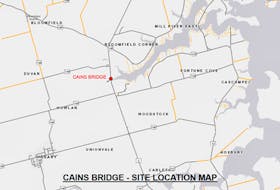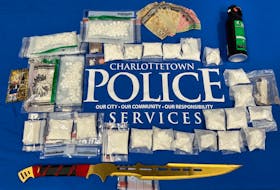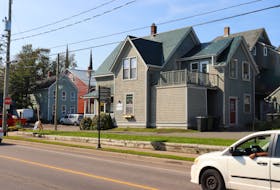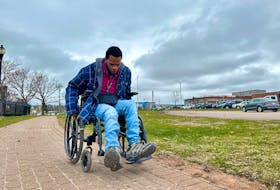CHARLOTTETOWN, P.E.I. — Attorney General Bloyce Thompson said his department is considering a crackdown on drug houses.
This follows a vote at Charlottetown council's monthly meeting on Monday, when Coun. Mitchell Tweel tabled a motion asking that the city draft a letter asking government to bring in a civil forfeiture law, legislation that would give police forces the right to seize property.

Council's motion passed unanimously.
"It's something that we'll have to work with enforcement agencies, the chiefs of police and staff to get a clear understanding on what these actions (would be) and what the impacts are going to be,'' Thompson said Tuesday, explaining that there's a lot of homework to do first.
Thompson said he and Tweel have had discussions about the issue before.
“I brought this forward because the status quo ... is simply not working,’’ Tweel said. “Although some arrests have been made, the continuation of drugs being sold, being purchased seven days a week, 365 days a year ... is plaguing the neighbourhoods. It’s a hazard, it’s unsafe (and) it’s dangerous.’’
Every province in Canada has civil forfeiture legislation, except for two — P.E.I. and Newfoundland and Labrador.
Thompson acknowledged the legislation exists in other provinces, where it works in some and not so well in others.
"As soon as I get the letter (from the city) I will be getting my department to look into it,'' the minister said. "We'll have to look at what the legislation would look like and whether it's going to make our communities safer.''
Tweel said there are at least 70 drug houses in Charlottetown, and council's vote was meant to send a clear message that it is serious about getting the "poison out of the neighbourhoods''. Tweel did not say where he got the number 70 from or what exactly constitutes a 'drug house'. Charlottetown Police Services would not identify a specific number but did say "the sale of illicit drugs remains a very serious issue in our city and province''.
“It truly boils down to public safety. This type of legislation is to support communities that are affected by houses that are occupied by people who are compromising public safety. Anything that gives us an extra tool to combat those types of activities, we’re in support of that.’’
-Deputy Police Chief Brad MacConnell
Deputy Police Chief Brad MacConnell said his department supports this type of legislation.
“It truly boils down to public safety,’’ MacConnell said. “This type of legislation is to support communities that are affected by houses that are occupied by people who are compromising public safety. Anything that gives us an extra tool to combat those types of activities, we’re in support of that.’’
MacConnell said the legislation would entail a complaint process, an investigative process and an enforcement process.
MacConnell said the current laws do create challenges for police departments.
“For example, if a house is being occupied by drug dealers, a typical scenario is police go in, (conduct) a search warrant and charges are laid a lot of the time. Then, it goes through a judicial cycle and a lot of the time the accused or the people charged can go right back into that residence and a lot of times, conduct the same types of activities.
“What this legislation does is once houses get designated a public safety risk ... it allows police or the Office of Public Safety to put measures in place ... (such as) seizure of the house.’’
However, MacConnell said one of his concerns is that Charlottetown has such a low vacancy rate and appropriate measures would have to be put in place to ensure people aren’t being thrown into the street. Tweel said his concern is for the young families that have moved out of the neighbourhoods because of the drug situation.
MacConnell said this kind of legislation would require consultations with all police forces as well as other stakeholders, such as municipal planning boards, public works and more.
“There are a lot of pieces to the puzzle that have to be put in place.’’
Thompson said they're taking this matter very seriously.
"If there's another tool that will help enforcement agencies in dealing with drug crime, we'll definitely look into it.''
Share your thoughts about this story. Comments are open on this article at SaltWire.com
Have your say
Want to wade into the debate? Write a letter to the editor and email it to [email protected]. Be sure to include a name, address and daytime telephone number where the author can be contacted. Letters should be no more than 250 words.









